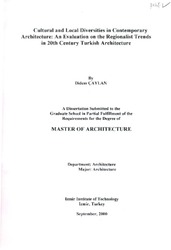Please use this identifier to cite or link to this item:
https://hdl.handle.net/11147/3460| Title: | Cultural and Local Diversities in Contemporary Architecture:an Evaluation on the Regionalist Trends in 20th Century Turkish Architecture |
| Authors: | Çaylan, Didem |
| Advisors: | Eyüce, Özen |
| Publisher: | Izmir Institute of Technology |
| Abstract: | This study focuses on the cultural and local diversities observed in 20th century architectural theory and practice, and especially the regionalist discourse in architecture, which can be evaluated as their categoric correspondent. Evaluating the concepts and influences behind the evolution of an architectural practice inspired by a sensitivity towards cultural and local conditions, this study claims that cultural and local diversities in 20th century architecture and their formulation as regionalism are rooted in the basic tension between the universal and particular, which has been present in Western culture since Enlightenment. Due to the conceptualization of the world in terms of bipolar contsructs such as universal and particular, rational and romantic, industrialized and indigenous and modern and traditional the urge to preserve cultural and local essence has often been formulated as a revolt against the universalizing forces of industrialization and modernization. In order to put the concept of regionalism into its historical context the study overviews the claims of regionality, nationality and contextuality that have been influential on architectural practice since 19th century. The regionalist approaches that have generated after World War II have been evaluated with reference to the varying concerns that they respond to. Referring to the significant theoretical works on the subject the viability of the regionalism as a valid critical approach in contemporary architecture has been discussed through a simultaneous study of regional(ist) works and their underlying ideas.This conceptual framework has been used to evaluate the contextualist, regionalist and nationalist discourses that have been influential in Turkish architecture as a consequence of the revolts against the imported "international style". The study focuses on the discussions on national and cultural identity that still occupy the Turkish architectural agenda, and evaluates the position of Turkish architectural practice within the construct of center - periphery. Considering that claims of regionality have often been used as a means of legitimization in Turkish architecture, the validity of the concepts behind regionalist practice have been challenged with reference to the current debates in mainstream architecture.Keywords: Modernity and tradition, center and periphery, universal and local, identity, regionalism, contextualism, nationalism, critical modernism, postmodernity, contemporary Turkish Architecture. |
| Description: | Thesis (Master)--İzmir Institute of Technology, Architecture, İzmir, 2000 Includes bibliographical references (leaves: 136-142) Text in English; Abstract: Turkish and English xi, 142 leaves |
| URI: | http://hdl.handle.net/11147/3460 |
| Appears in Collections: | Master Degree / Yüksek Lisans Tezleri |
Files in This Item:
| File | Description | Size | Format | |
|---|---|---|---|---|
| T000063.pdf | MasterThesis | 83.8 MB | Adobe PDF |  View/Open |
CORE Recommender
Page view(s)
326
checked on Jun 10, 2025
Download(s)
110
checked on Jun 10, 2025
Google ScholarTM
Check
Items in GCRIS Repository are protected by copyright, with all rights reserved, unless otherwise indicated.